State-affiliated media outlets, BJP party members, and suspicious accounts target nationwide Kisan Andolan movement
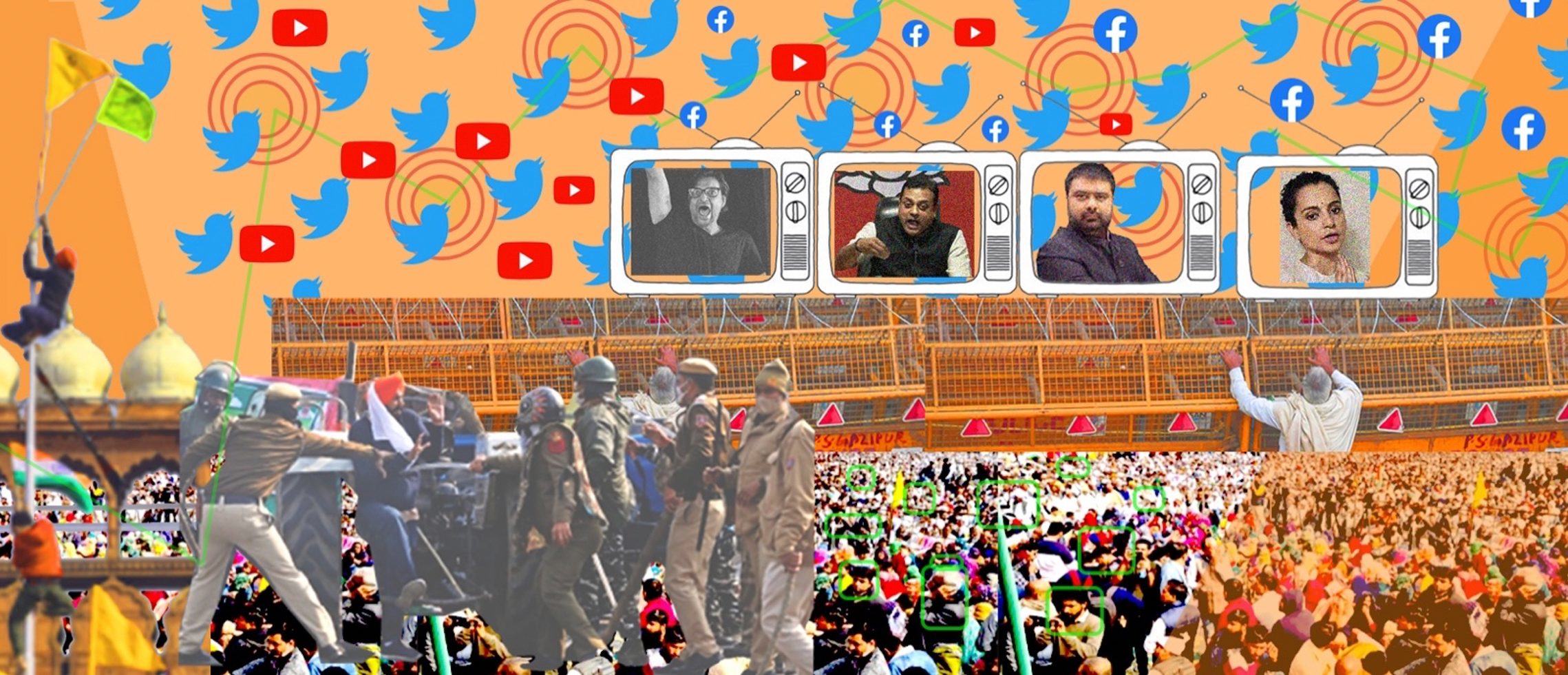
India’s 72nd Republic Day celebrations on January 26, 2021 were marred by the outbreak of violence between protesting farmers and policemen in armed clashes that left one protester killed and 300 police officers injured. As fighting between fringe elements of the protesters and local police continued in the national capital, social media in the country was flooded with narratives maligning the broader Kisan Andolan (“farmer protest”) movement as seditious and calling on the Delhi police to engage in violence against the protesters and their families.
The DFRLab analyzed the activity of two hashtags — #दिल्ली_पुलिस_लठ_बजाओ (“Delhi Police Beat Them”) and #khalistaniterrorists — that trended nationally on Twitter on January 26 after receiving 319,898 and 117,372 mentions on the platform, respectively. The hashtags were amplified by prominent right-wing influencers, verified profiles of state-affiliated media outlets, and members of the ruling-Bhartiya Janata Party (BJP). This activity was complemented by a number of anonymous and inauthentic accounts that spammed the hashtag multiple times. The hashtags were also amplified on Facebook, albeit to a lesser degree, via pro-BJP pages, right-wing communities, and pages dedicated to political satire. This activity was further complemented by multiple anonymous and individual accounts that spammed the hashtag in the comments section of videos uploaded on the pages of popular right-wing domestic media outlets.
Taken together, the cross-platform activity of the politicized hashtags in the hours following the outbreak of violence shows how state-affiliated and pro-government actors flood popular social media with partisan narratives as a means of manipulating public perception around an ongoing event. In particular, the inauthentic amplification of narratives explicitly calling for violence against protesters ties into a broader concern in India, where in recent years online abuse and calls for violence against students, citizen movements and journalists has resulted in real-world violence.
Jai Jawan, Jai Kisan (“Hail to the Soldier, Hail to the Farmer”)
For months, agricultural workers in India have held peaceful protests against a series of contentious legislative bills enacted by the Indian government that seek to liberalize the country’s agricultural sector. Supporters of the farm bills argue that that the measures widen farmers access to the market offering them the potential of increased income. Critics, however, assert that by weakening the current Minimum Support Price (MSP) guarantee system, the laws would deepen existing economic inequalities in the farming sector. Others point to the controversial manner in which the bills were forced through the Indian Rajya Sabha (upper house) of the Indian Parliament by means of legislative chicanery, arguing that its passage reflected a growing centralization of power in the hands of the ruling BJP-government.
Shortly after, beginning in the north Indian states of Punjab and Haryana in August 2020 before shifting to the outskirts of national capital in November of the same year, tens of thousands of farmers encamped themselves outside New Delhi and promised to continue protesting until the three laws were repealed.
On January 26, 2021, however, fringe elements of the protest movement veered away from the route of a rally pre-ordained with the local authorities and engaged in armed clashes with Delhi police. The protestors also destroyed barricades set up by the police to prevent the rally from entering the centre of the city. The same group later stormed the Lal Qila (Red Fort), a historic landmark, hoisting up two flags at the monument, one associated with a farmer’s union, and another the Nishan Sahib, a religious flag associated with Sikhism.
Gaming Twitter
Using Meltwater Explore, a social media analysis tool, the DFRLab analyzed the activity of #दिल्ली_पुलिस_लठ_बजाओ (“Delhi Police Beat Them”) and #khalistaniterrorists across popular digital media platforms between January 1 and February 1, 2021. This analysis revealed that both hashtags were predominantly amplified via Twitter, with the platform accounting for 99.7 percent of all mentions of the hashtag within the examined timeframe.
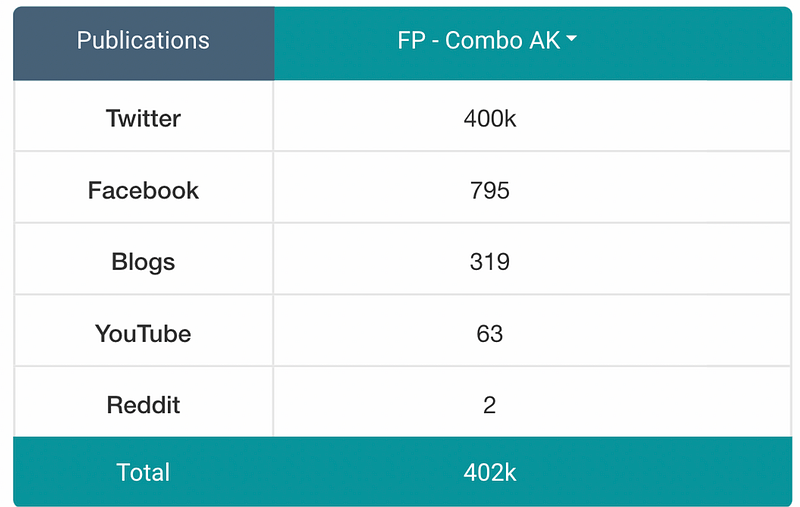
Further scrutiny of the key metrics of both hashtags on Twitter revealed they were amplified by several right-wing influencers with large followings on the platform. The top three tweets using the hashtag #दिल्ली_पुलिस_लठ_बजाओ included @kanganateam, @DChaurasia2312, and @gauravbh: respectively, a Bollywood actress-turned-online-troll; a TV anchor for News Nation, a Hindi-language media platform; and the national spokesperson for the BJP.


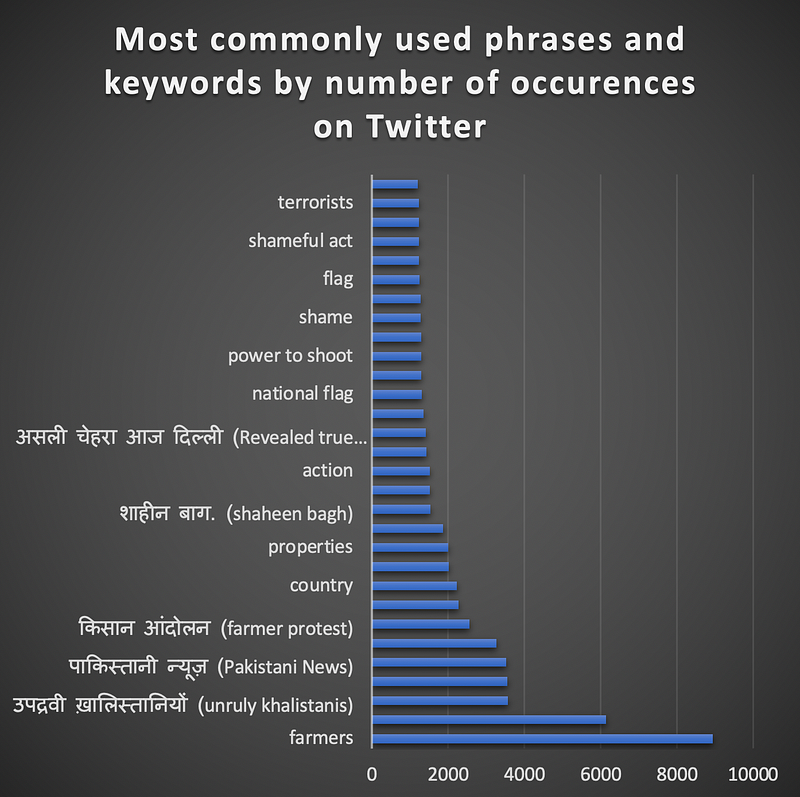
The verified accounts posted the hashtag on January 26 alongside messages calling for violence against the protesting farmers. An examination of the most commonly occurring keywords and phrases with #दिल्ली_पुलिस_लठ_बजाओ on Twitter revealed that phrases such as “terrorists,” “power to shoot,” and “उपद्रवी ख़ालिस्तानियों” (“unruly khalistanis”) appeared alongside the hashtag 1,225, 1,296, and 3,564 times, respectively. The third phrase refers to the Khalistan Movement, a Sikh separatist movement calling for the establishment of an independent state in the territory currently divided between India and Pakistan.
Similarly, the top three tweets amplifying #khalistaniterrorists were from the handles @DChaurasia2312, @MajorPoonia and @News18India: accounts belonging to the aforementioned Hindi news personality, a right-wing influencer and member of the BJP with a history of spreading disinformation, and the official account of News18 India, a domestic TV channel.
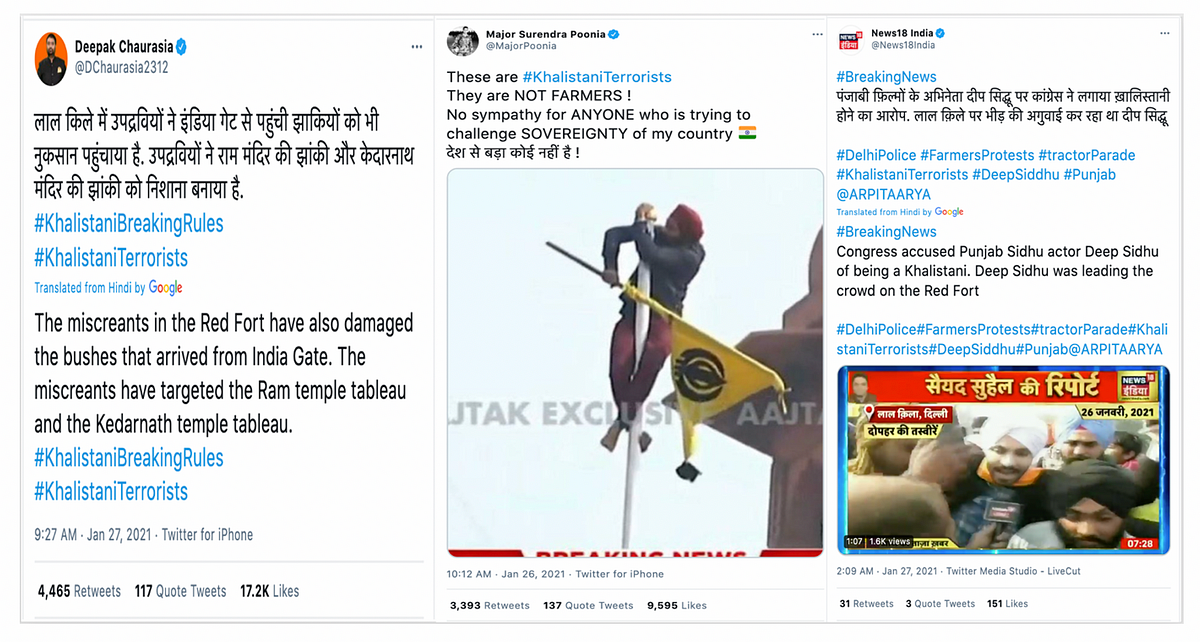

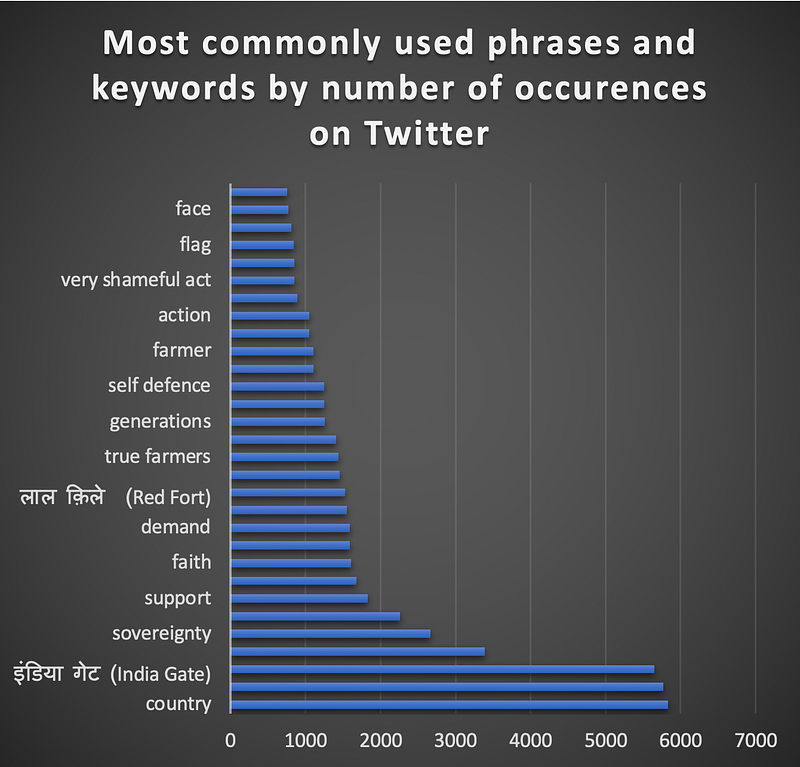
The verified accounts also amplified the hashtag alongside messages that sought to use the outbreak of violence at the Lal Qila as a means of discrediting the Kisan Andolan as a whole. Accordingly, the posts baselessly alleged the farmer agitation was a front for the Khalistan movement. An analysis of the most commonly used keywords and phrases used alongside the hashtag revealed that “terrorists,” “lies,” and “sovereignty” appeared 1,105, 1,678 and 2,663 times, each.
Both hashtags were also spammed hundreds of times by a number of individual accounts with smaller followings that exhibited multiple characteristics associated with inauthentic or suspicious behavior. These characteristics include maintaining functional anonymity with no profile pictures or identifying information, account names consisting of alphanumeric scrambles, suspiciously high levels of activity with little-to-no downtime and timelines that served solely to amplify right-wing and pro-BJP hashtags and narratives on the platform.
The DFRLab used Meltwater Explore to sift through the total activity of both hashtags to identify the top ten posters by volume before employing Twitonomy and Truthnest, two open-source analytical tools, to examine the individual accounts.
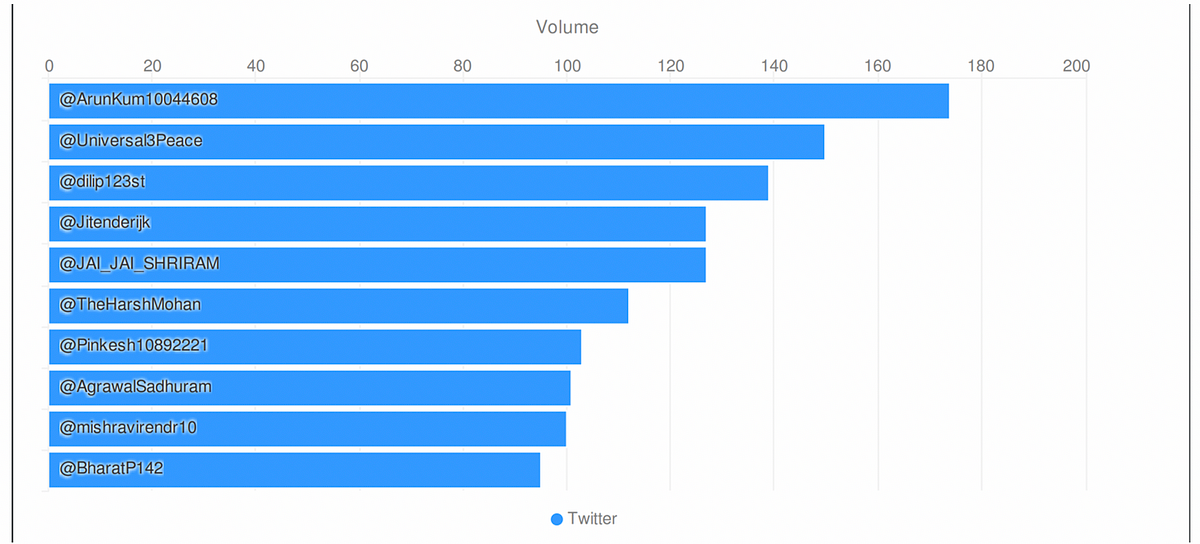
An illustrative example is provided by @Jitenderijk, an account that posted #दिल्ली_पुलिस_लठ_बजाओ over 125 times in the month of January.

The DFRLab analyzed a sample of 3,087 tweets posted by the account between January 23 and February 1, 2021, revealing the account posted an average of 308 tweets per day during that time frame — an extraordinarily high rate of posting, even among enthusiastic Twitter users. On January 26 alone, it tweeted more than 850 times. Further investigation of its posting activity revealed its timeline consisted almost entirely of amplified pro-BJP accounts, with 98% of the tweets consisting of re-tweets instead of original messaging.

Working in concert, the use of both hashtags by verified accounts belonging to right-wing influencers, BJP officials and its spamming on the platform by smaller accounts exhibiting inauthentic behaviour helped propel both #दिल्ली_पुलिस_लठ_बजाओ and #Khalistaniterrorists to the “trending” section of Twitter in India for multiple hours on January 26, 2021. This in turn further exposed the hostile narratives targeting the Kisan Andolan to a more diverse audience on the platform, helping them accrue 589 million impressions at the time of analysis.

Amplification on Facebook
The DFRLab used CrowdTangle to examine the activity of both hashtags on Facebook between January 1 and February 1, 2021. While the hashtags received less amplification on Facebook in comparison to Twitter gaining 105,579 interactions in the examined timeframe, the strategy employed to promote them across the platform was remarkably similar.

Pages that posted the partisan hashtags alongside messages targeting the Kisan Andolan included @SambitPatraNDA, an unofficial fan page for the BJP national spokesperson; @OurIndiaFirst19, a right-wing community; and @HinduAshramFoundation, a page dedicated to the religious followers of Pragya Singh Thakur, a far-right Hindutva nationalist politician and BJP member of parliament for the constituency of Bhopal.

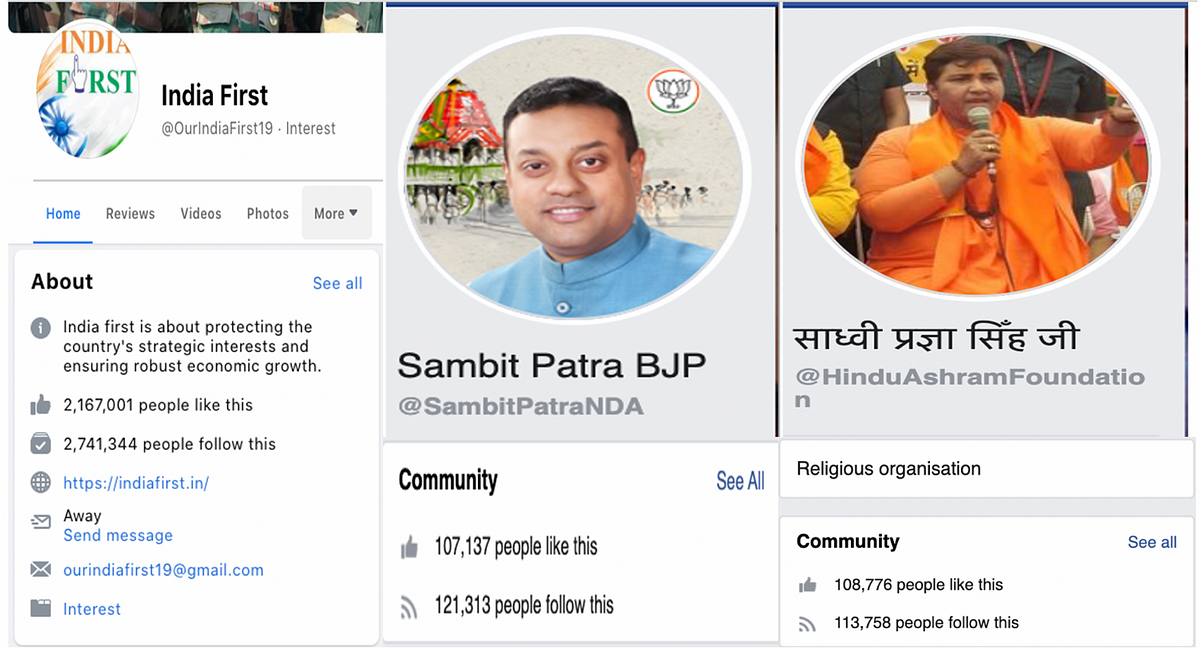
The hashtags were also posted repeatedly in the comments section under posts on verified pages belonging to right-wing domestic media outlets, including Republic Bharat, Zee News, ABP News, and Aaj Tak. While some of the posts simply consisted of spamming the hashtag, others used them alongside messages explicitly calling for violence against the protesters.

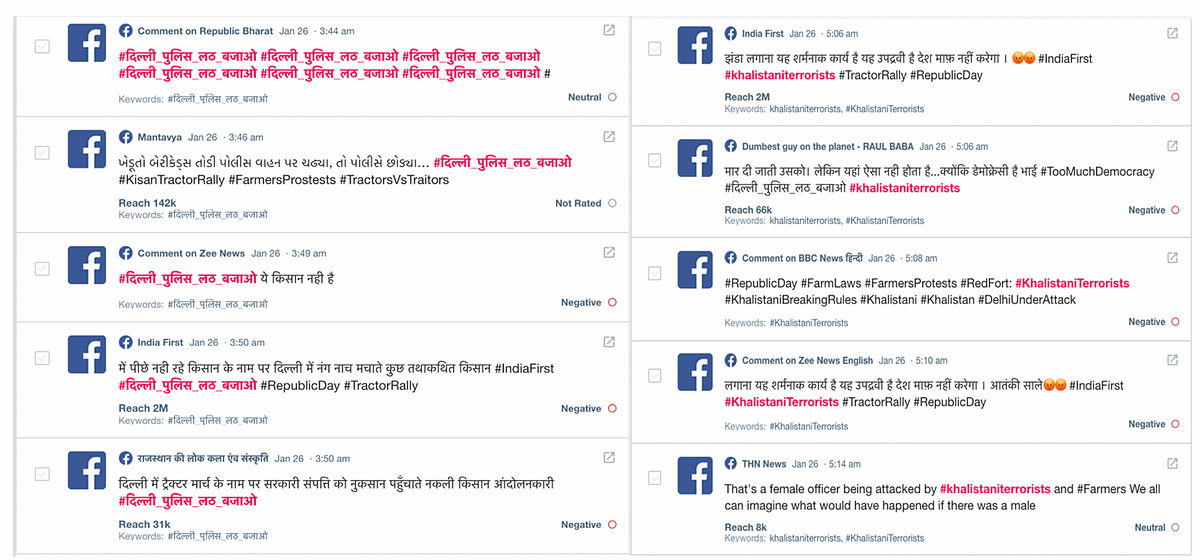
Several of the accounts involved in this commenting behavior were “locked” profiles that maintained anonymity and whose timelines served solely to amplify right-wing and pro-government narratives. Others appeared to be authentic profiles belonging to Indian users whose timelines revealed an overt support of the BJP. The rapid posting of the hashtags on Facebook by a range of suspicious accounts suggests inauthentic amplification via scheduling software or the manual crowd-sourcing of posts via dedicated online groups run by BJP-officials dedicated to such causes.
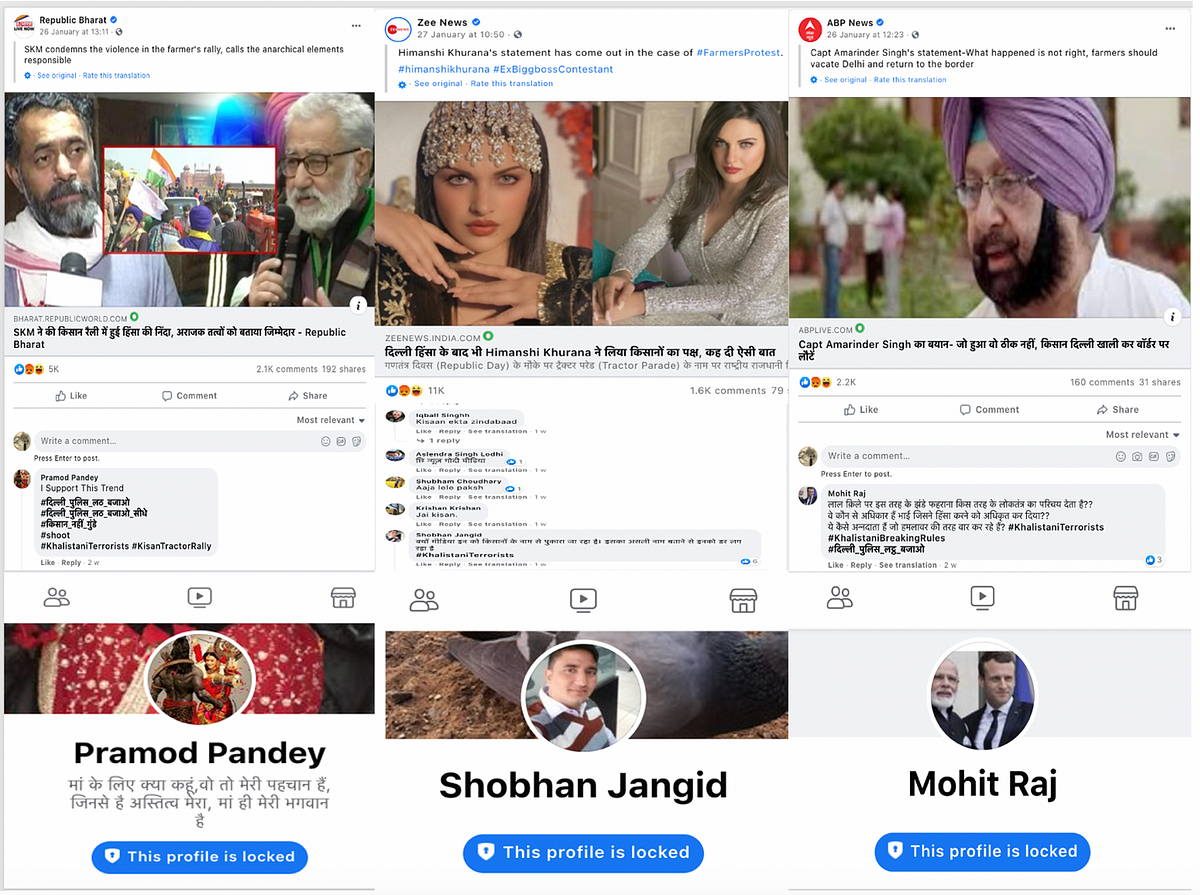
In the immediate aftermath of a crisis event, such as protests, misinformation can flourish in the information vacuum. The targeted dissemination of hostile narratives via popular social media platforms in these cases can play a significant role in shaping public opinion around an ongoing and politically significant event. These hostile narratives were exposed to tens of millions of Indian users over the month of January 2021 with a significant uptick in amplification from January 26 onwards, following the outbreak of violence.
Moreover, by working to delegitimize the Kisan Andolan as “terrorists” and calling for violence against the protesters, these pro-government actors sought to create an enforced dichotomy, dividing citizens as either “terrorists” or “nationalists” and thus enabling the “othering” of their political opponents.
This incendiary rhetoric helps legitimize the exercise of violence against those with whom one may politically disagree, hampering the discussion about the scope and nature of reforms needed in India’s agricultural sector.
Ayushman Kaul is a Research Assistant, South Asia, with the Digital Forensic Research Lab (@DFRLab).
Follow along for more in-depth analysis from our #DigitalSherlocks.

